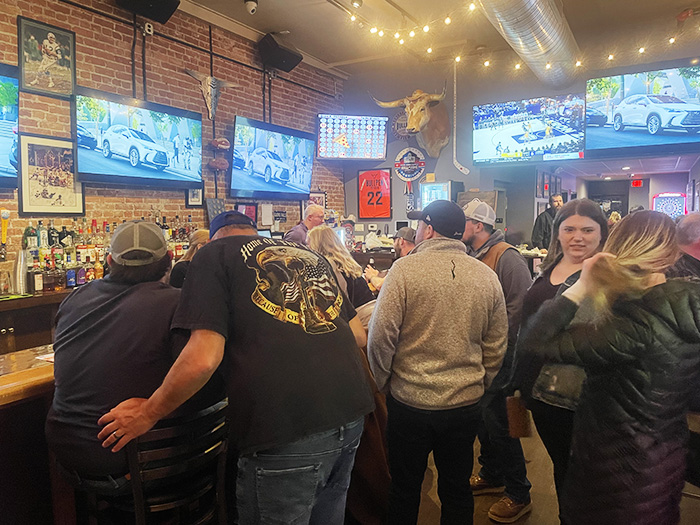By Ben Westcott, Chronicle Staff Writer

Co-owner Paulie Bricoccoli said getting sporting events to stream on the bar’s 19 TVs isn’t as easy as it used to be.
“Streaming is definitely a pain in the neck,” Mr. Bricoccoli told The Chronicle.
“There’s more stuff out there, but it’s all expensive now.”
He said streaming the NFL for a season in 1996 cost them $600. Now it’s $5,200, and “it goes up every year.”
It’s not only costly, it’s increasingly complicated — and stressful.
Mr. Bricoccoli remembers an NFL opening day a couple of years ago. The bar was full of patrons. But five minutes before the 1 p.m. games began, none of the establishment’s TVs had any of the football working.
“You could see people getting nervous. Like, where are the games?” Mr. Bricoccoli recalled. “And I’m out in the parking lot [on the phone] yelling at people from DirecTV and sweating.” Luckily, the feed started working at 12:58 p.m., just two minutes before the games started.
“I finally got through to somebody,” Mr. Bricoccoli said.
Now the somebody The Bullpen regularly relies on is Cliff Nelson, owner of South Glens Falls-based Allstar Systems.
For the last 25 years, Allstar has managed the Bullpen’s TVs as well as cameras, jukebox and other audio.
Mr. Nelson said Allstar operates in about 1,000 properties in New York, Vermont and western Massachusetts, primarily bars, hotels and restaurants.
Mr. Bricoccoli opens a hidden door and reveals a huge rack of equipment that Allstar had painstakingly assembled and installed just weeks prior.

Mr. Nelson says, “The first thing we provide is understanding of the commercial landscape, which is very different from the residential landscape.
“Streaming is not really designed for commercial use. It’s designed for residential use. There really aren’t any streaming players that are enterprise level.”
He said it used to be that you could run a bar with just DirecTV.
“Now, no bar that in any way sees itself as a sports bar can have just one single video content provider…” Mr. Nelson said. “There’s nobody that has everything that you need. DirecTV is by far the best. They have the most, but they absolutely do not have everything.”
“It’s getting very, very fragmented,” Mr. Nelson said of the industry. “And it’s going to get way, way, way worse before it gets better. Every time deals come up, everybody’s trying to buy that content. Everybody’s outbidding everybody else.”
He said, “The biggest thing facing bar owners is they’re just not paying attention as much as they need to the fact that content is being fragmented….
“If you’re a bar and you just have a single subscription to a single provider, maybe like you’ve been doing for the last 20 years, it’s not sufficient anymore.
“It’s not enough. All of the bar owners that are in touch with what’s going on are making major investments in their technology now. They have to.”
Mr. Nelson said, “If your competitors have that content that you don’t have, your customers will go to them. And the bigger the market, the more competitive it is. Customers know.
“You can’t say ‘I don’t have the Masters on. We don’t get that.’ Your customers know that the Masters is playing right now. You just can’t figure out how to get it. That makes you look bad.”
So how does a bar go about not looking bad? “It’s complicated,” he said. “And it’s difficult. And it costs money. If you’re just waiting for the free, cheap, easy solution, you’re going to be out of business before it gets here. It’s just the way it is.”
Mr. Nelson says, “We put in a system that takes all of that stuff and consolidates it. We’re taking this very complex environment and making it simple.
“There’s a myriad of content out there that’s really easy to put on one TV, but really hard to distribute to lots of TVs. We put them all into a rack, we control everything, we wire in all of the TVs, and we put it on one touch panel.
“One touch-panel can turn everything on and off, can interact with the TVs and all the different sources and keeps everything in sync. It makes it so one person can effectively operate their system easily. It’s a save of time and hassle” and makes it easier for bar and restaurant staff to operate TV and audio.
“Our system allows the training protocols for a new hire to be greatly shortened,” Mr. Nelson said.
“Rather than needing to know how everything works, you just need to go here and hit this button. Say you’ve got 20 TVs. Do you think you’re going to go around as a bartender 20 times and do all of that while people are screaming for drinks? It’s not practical.”
He said, “You don’t want to be one of those places that has 40 TVs and you walk in and 30 of them are on ESPN. That’s a staff that’s not paying attention or doesn’t have a system that’s easy for them to work with.”
The Bullpen’s Mr. Bricoccoli says of Allstar, “They have us prepped for the next 10 years of however TV evolves. Eventually it’s all going to be wireless and remote. But it can go a lot of different ways. Now with our new system we’re prepared to go forward, and it freshened everything up.”
With the new system, pointing remotes at TVs is a thing of the past. Now all of the different TVs and their audio, as well as music that plays at the bar, is controlled from a small touch panel behind the bar. “The speakers have always been good, but they’re definitely much more clear and there’s more pinpoint control on our new system,” Mr. Bricoccoli said. “It seems like we’re able to modulate the volume a lot better.”
And he says that Allstar makes things look good. “They worry as much about the aesthetics as they do the functionality of it,” he said.
Allstar was founded in 1996 in Syracuse. About a decade ago it started working out of a building in Fort Ann. It moved to South Glens Falls a little over a year ago, because it needed more room, Mr. Nelson said. Allstar uses three buildings on its new property. They also have an operation in Herkimer, New York.
“A lot of our projects we will build here first, instead of building on site,” Mr. Nelson said.
When he first got involved with Allstar 12 years ago, he said there was one employee. Now there’s 15.
“Our business has grown by customers asking us, ‘Hey, can you do this?’ And after a couple times, we go, ‘Yeah, we can do that,’” Mr. Nelson explained.
Copyright © 2024 Lone Oak Publishing Co., Inc. All Rights Reserved
 Glens Falls Chronicle Serving the Glens Falls/Lake George region; Warren, Washington and northern Saratoga counties since 1980
Glens Falls Chronicle Serving the Glens Falls/Lake George region; Warren, Washington and northern Saratoga counties since 1980

